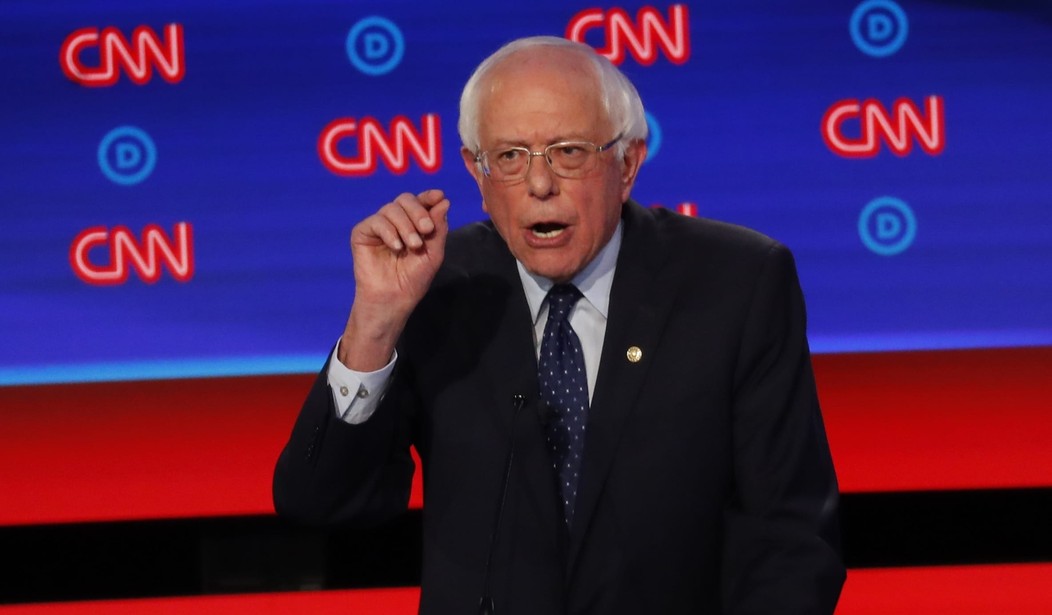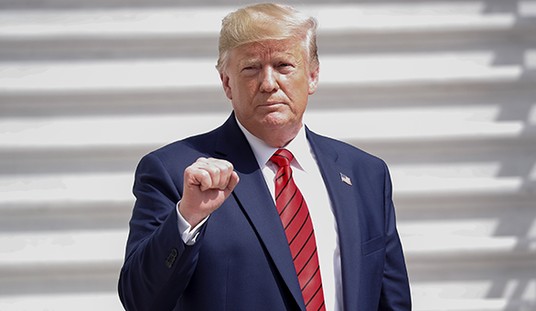Sen. Bernie Sanders (I-Vt.) appeared to accuse President Donald Trump of hypocrisy on Wednesday, faulting him for supporting religious freedom after condemning countries that punish or execute LGBT people. The Trump administration released a proposed rule expanding the liberty of religious organizations to hire only adherents of their faith, and liberal groups like the ACLU mischaracterized it as an attack on LGBT people.
“Mr. Trump is a lying bigot,” Sanders tweeted, showing two tweets that he claims showcase the president’s hypocrisy.
Mr. Trump is a lying bigot. pic.twitter.com/uXcajQtLdQ
— Bernie Sanders (@SenSanders) August 14, 2019
Sanders showed Trump’s tweet from May 31, on the eve of LGBT Pride Month: “As we celebrate LGBT Pride Month and recognize the outstanding contributions LGBT people have made to our great Nation, let us also stand in solidarity with the many LGBT people who live in dozens of countries worldwide that punish, imprison, or even execute individuals….on the basis of their sexual orientation. My Administration has launched a global campaign to decriminalize homosexuality and invite all nations to join us in this effort!”
As we celebrate LGBT Pride Month and recognize the outstanding contributions LGBT people have made to our great Nation, let us also stand in solidarity with the many LGBT people who live in dozens of countries worldwide that punish, imprison, or even execute individuals….
— Donald J. Trump (@realDonaldTrump) May 31, 2019
In other words, Trump rightly stands with LGBT people who face imprisonment and even execution in many countries. Even staunch social conservatives oppose these kinds of horrific laws.
Sanders’ second tweet came from the ACLU: “BREAKING: The Department of Labor just proposed a rule that aims to let government contractors fire workers who are LGBTQ, or who are pregnant and unmarried, based on the employers’ religious views. This is taxpayer-funded discrimination in the name of religion. Period.”
BREAKING: The Department of Labor just proposed a rule that aims to let government contractors fire workers who are LGBTQ, or who are pregnant and unmarried, based on the employers’ religious views.
This is taxpayer-funded discrimination in the name of religion. Period.
— ACLU (@ACLU) August 14, 2019
The ACLU is deliberately casting the proposed rule in the worst possible light and Sanders seems to be claiming that the rule punishes LGBT people.
The rule, proposed by the Labor Department’s Office of Federal Contract Compliance Programs (OFCCP), aims to clarify the religious exemption to federal civil rights laws.
“Some religious organizations have previously provided feedback to OFCCP that they were reluctant to participate as federal contractors because of uncertainty regarding the scope of the religious exemption,” the proposal explains. The rule addresses Executive Order 11246, an order dating from President Eisenhower which Obama expanded — without a public comment period — in 2014.
“Among other changes, this proposal is intended to make clear that the Executive Order 11246 religious exemption covers not just churches but employers that are organized for a religious purpose, hold themselves out to the public as carrying out a religious purpose, and engage in exercise of religion consistent with, and in furtherance of, a religious purpose. It is also intended to make clear that religious employers can condition employment on acceptance of or adherence to religious tenets without sanction by the federal government, provided that they do not discriminate based on other protected bases,” the proposed rule explains.
The OFCCP referenced three key Supreme Court decisions in its proposal: Masterpiece Cakeshop v. Colorado Civil Rights Commission (2018), which defended a Christian baker from anti-religious animus; Trinity Lutheran Church v. Comer (2017), which ruled that a government program could not exclude a religious organization on the grounds of its religion; and Burwell v. Hobby Lobby Stores (2014), which protected a closely-held family company from being compelled to provide some forms of birth control and abortion-inducing drugs.
Luke Goodrich, vice president and senior counsel of the religious liberty law firm Becket, supported the proposed rule. The policies “STILL prohibit employment discrimination based on all of the same grounds. They STILL require federal contractors to make their services available to ALL without discrimination,” he tweeted.
So today’s regs recognize the vital role religious groups play in federal contracting. They STILL prohibit employment discrimination based on all of the same grounds. They STILL require federal contractors to make their services available to ALL without discrimination. 13/
— Luke Goodrich (@LukeWGoodrich) August 14, 2019
Goodrich added, “The regs simply follow the text of Title VII by clarifying that hiring ‘individuals of a particular religion’ means religious groups can hire individuals who adhere to the group’s observances and practices … This allows religious organizations to continue serving the needy without compromising their sincere religious beliefs — which is a win for religious freedom.”
Alliance Defending Freedom Senior Counsel Greg Baylor also defended the proposed rules.
“All Americans have the freedom to operate according to their religious beliefs, and those freedoms don’t disappear when a university, charity, or international nongovernmental organization enters into a contract with the federal government,” Baylor explained. “The Trump administration is right to consider adopting a rule that would clarify the ability of these organizations to operate based on their religious beliefs, maintain partnerships with the government, and serve the common good all at once.”
“We live in a diverse society, and there’s no reason or constitutional basis to single out and marginalize certain views. For example, eliminating faith-based nonprofits means that fewer foster children will find a forever home, fewer impoverished citizens will benefit from shelter and job training, and fewer people will receive compassionate assistance. It also leaves overtaxed communities without the vital services they provide. Clarifying these freedoms would protect social service providers and everyone else who benefits from their work, so we commend the Department of Labor for this proposed rule,” Baylor concluded.
Under the Obama administration, religious organizations were forced to violate their consciences by paying for contraception and abortifacients, most memorably the Little Sisters of the Poor.
President Donald Trump issued an executive order promoting free speech and religious freedom in 2017. A study one year later found that this order allowed faith-based charities to provide health care to 13.7 million Americans, along with many other salutary effects.
LGBT activists have fought to force faith-based adoption agencies to place children with same-sex couples, claiming that an agency’s refusal to do so constitutes discrimination. These agencies often work with local and state governments to place children, so they represent a microcosm of the federal rules on religious freedom for government contractors.
Religious freedom rules like the OFCCP proposal enable faith-based organizations to abide by their consciences, serving the people while allowing other organizations to provide other services to LGBT people. Many adoption agencies do place children with same-sex couples, for example.
Attempts to weaponize non-discrimination law against religious entities that disagree with LGBT activism harm the public. The Supreme Court decisions cited in the OFCCP rules make it clear that government cannot single out religious organizations for adverse treatment, and the Trump administration is right to support religious freedom in this way.
Regardless, Trump is not a hypocrite for opposing governments that imprison and execute LGBT people while supporting the religious freedom of people who disagree with LGBT activism. There is no contradiction there, and Trump was not lying when he stood against the death penalty for LGBT people. Bernie Sanders needs to chill out.
Follow Tyler O’Neil, the author of this article, on Twitter at @Tyler2ONeil.









Join the conversation as a VIP Member